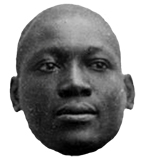





























Early life
Johnson
was born the third child of nine, and the first son, of Henry and
Tina "Tiny" Johnson, two former slaves who worked blue collar jobs
as a janitor and a dishwasher to support their children and put them
through school. His father Henry served as a civilian teamster of
the Union's 38th Colored Infantry, and was a role model for his son.
As Jack once said, his father was "The most perfect physical specimen
that he had ever seen, "although his father was only 5 ft 5 in and
left with and atrophied right leg from his service in the war.
Growing
up in Galveston, Texas, Johnson attended five years of school and
was known as a bright, talkative, and energetic kid. Like all of his
siblings, Jack was expected to work to keep the family going while
he was growing up. He helped sweep classrooms to ease the work for
his father, and he worked for the local milk man before school, taking
care of the horses while the milk man got off to make deliveries.
For this work he was paid 10 cents and a red pair of socks, which
his boss had a seemingly endless supply of, every Saturday.
Although
Jack grew up in the South, he said that segregation was not an issue
in the somewhat secluded city of Galveston, as everyone living in
Galveston's 12th Ward was poor and went through the same struggles.
Johnson remembers growing up with a "gang" of white boys, in which
he never felt victimized or excluded. Remembering his childhood, Johnson
said, "As I grew up, the white boys were my friends and my pals. I
ate with them, played with them and slept at their homes. Their mothers
gave me cookies, and I ate at their tables. No one ever taught me
that white men were superior to me." Jack carried this mentality to
his boxing career, as he would not be intimidated to fight any man,
no matter their race.
During his days as a child Johnson was
a frail young boy and not much of a fighter, as he grew up under the
protection of his two older sisters until he was twelve yers old.
Jack was usually able to avoid quarrels until he was twelve years
old, and was confronted by a boy who hit him on the jaw. About to
run away from the quarrel Johnson remembers grandma Gilmore, or his
mother (the story varies by whomever tells it), who told him, "Arthur,
if you do not whip Willie, I shall whip you". After winning the fight,
Johnson developed a new mentality, and toughness to carry with him
through his life.
After Johnson quit attending school, he began
a job working at the local docks, soon discovering that he hated it.
He made several other attempts at working other jobs around town,
until one day he made his way to Dallas, finding work at the race
track exercising horses. Jack stuck with this job until he would find
a new apprenticeship for a carriage painter by the name of Walter
Lewis. Lewis, who had a passion for boxing, enjoyed watching friends
spar, and although boxing was somewhat new to Johnson, he began to
learn how to hit hard and strong. Johnson later claimed that it was
thanks to Lewis that he would become a boxer.
After returning
home for a short period of time, Johnson once again left at the age
of 16, this time heading for Manhattan. While in Manhattan, Jack found
living arrangements with Joe Walcott, a welterweight fighter from
the West Indies. Once again Johnson found work exercising horses for
the local stable, until he was fired for exhausting a horse. Soon
finding employement as a janitor for a gym owned by German born heavyweight
fighter, Herman Berneau, Johnson eventually put away enough for two
pairs of boxing gloves, sparring every chance he got. Throughout his
time in Manhattan, living with Walcott and working for Berneau, Johnson
began to develop his unique style of fighting which would make him
famous.
